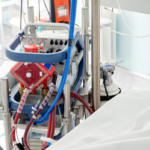Critical Care Medicine has seen remarkable advancements in recent years, significantly improving survival rates and patient outcomes in Intensive Care Units (ICUs). With the integration of cutting-edge technologies and innovative treatment approaches, intensivists can now provide precise, patient-centered care. Some of the most impactful innovations include Extracorporeal Membrane Oxygenation (ECMO), Continuous Renal Replacement Therapy (CRRT), advanced monitoring systems, and improved sepsis management. These advancements have revolutionized critical care, making it possible to manage life-threatening conditions more effectively.
1. Extracorporeal Membrane Oxygenation (ECMO): A Life-Saving Technology
ECMO is an advanced life-support technique used for patients experiencing severe cardiac and respiratory failure. It provides temporary support by oxygenating the blood outside the body, allowing the heart and lungs to rest and recover.
Types of ECMO:
- Veno-Arterial (VA) ECMO – Supports both heart and lung function, used in cases of cardiac arrest or severe heart failure.
- Veno-Venous (VV) ECMO – Primarily used for severe lung failure, such as ARDS (Acute Respiratory Distress Syndrome).
Benefits of ECMO in Critical Care:
- Supports patients with severe pneumonia, ARDS, or post-surgical complications.
- Acts as a bridge to lung or heart transplantation.
- Increases survival chances for patients in cardiac shock.
With advancements in ECMO technology, newer portable ECMO machines have made patient transportation safer and more efficient, ensuring timely intervention.
2. Continuous Renal Replacement Therapy (CRRT): Revolutionizing Kidney Support in ICU
Kidney failure is a common complication in critically ill patients, often requiring immediate intervention. Continuous Renal Replacement Therapy (CRRT) has emerged as a superior alternative to traditional dialysis for ICU patients.
How CRRT Benefits Critically Ill Patients:
- Provides gentle and continuous filtration of toxins, preventing hemodynamic instability.
- Helps manage fluid overload in patients with sepsis or multi-organ failure.
- Allows precise electrolyte and acid-base balance control, crucial for ICU patients.
CRRT is particularly beneficial for patients with septic shock, acute kidney injury (AKI), and multi-organ dysfunction syndrome (MODS), improving survival rates.
3. Advanced Monitoring Systems: Enhancing Precision in ICU Care
The integration of Artificial Intelligence (AI) and real-time monitoring systems has transformed ICU care, enabling clinicians to make faster and more accurate decisions.
Latest Monitoring Technologies in ICU:
- Hemodynamic Monitoring: Devices such as Pulmonary Artery Catheters (PAC), Cardiac Output Monitors, and Invasive Blood Pressure (IBP) systems provide real-time insights into cardiovascular function.
- Neuromonitoring: Invasive ICP (Intracranial Pressure) monitoring helps manage traumatic brain injuries and stroke patients.
- AI-Based Predictive Analytics: AI-powered algorithms analyze patient data to detect early signs of deterioration, enabling timely intervention.
These advanced monitoring techniques ensure better patient safety, early detection of complications, and reduced ICU mortality rates.
4. Sepsis Management: Cutting-Edge Strategies to Combat Deadly Infections
Sepsis remains one of the leading causes of mortality in ICUs. With recent advancements, early diagnosis and aggressive management strategies have significantly improved survival rates.
Modern Approaches to Sepsis Treatment:
- Rapid Biomarker Detection: New diagnostic tests such as Procalcitonin (PCT) and SeptiCyte® technology help in early sepsis detection.
- Targeted Antimicrobial Therapy: AI-driven software assists in selecting the most effective antibiotics, reducing resistance.
- Extracorporeal Blood Purification: Innovative therapies like Cytosorb, Toraymyxin, and Oxiris filters help remove inflammatory mediators from the blood, reducing organ damage.
- Personalized Sepsis Management Protocols: Individualized treatment strategies, including immune-modulating therapies and cytokine storm control, have shown promising results.
Summary
The continuous evolution of critical care medicine has led to remarkable innovations, improving survival rates and patient outcomes in ICU settings. Technologies like ECMO, CRRT, advanced monitoring systems, and modern sepsis management have become game changers, allowing intensivists to manage life-threatening conditions more effectively.
Dr. Amit Kumar Choudhary, an expert in Critical Care Medicine, holds an MD in Anesthesia and DrNB in Critical Care Medicine. With extensive experience in managing critically ill patients, he specializes in advanced life-support techniques, sepsis management, and multidisciplinary ICU care. Based in Pune, he is dedicated to providing patient-centered, evidence-based treatment to improve ICU outcomes.
For expert critical care consultation in Pune, Dr. Amit Kumar Choudhary is a trusted name, ensuring world-class ICU care with the latest advancements in medical technology.




